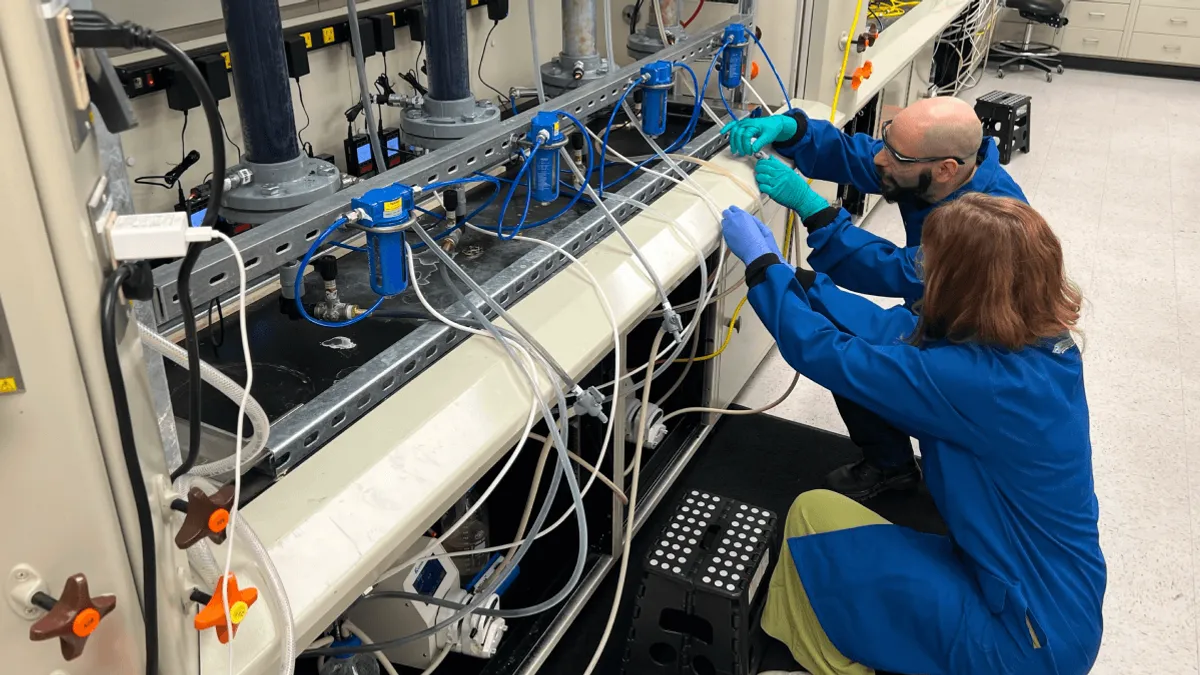Editor’s note: Agtech Seedlings is a weekly roundup of the latest in agriculture technology news, digging into venture funding, product announcements and other innovation milestones. Have news to share? Email us here.
Windfall Bio reaches commercial milestone for its methane-eating microbes
Amazon-backed startup Windfall Bio said it successfully scaled production of methane-eating microbes, a milestone in sustainable fertilizer development.
Windfall Bio said fermentation of the microbes reached 17,000 liters, representing commercial-scale production of its methane removal solution. The microbes consume methane and transform "into nitrogen-rich biomass that can be processed into high-value organic fertilizer," according to the release.
Windfall is testing its organic fertilizer as it pursues regulatory approvals. It is also providing large samples to customers to establish a market.
“This achievement not only demonstrates our ability to deploy a nature-based solution at scale but also redefines how industries can turn harmful methane emissions into valuable products like organic fertilizer," Josh Silverman, co-founder and CEO of Windfall Bio, said in a statement.
Windfall raised $28 million last April from backers including Amazon's Climate Pledge. Amazon said it intends to pilot the solution among Whole Foods suppliers.
Syngenta leverages 'full power of AI' for biostimulant research
Seed and pesticide giant Syngenta announced a partnership with artificial intelligence company TraitSeq to advance development of biological stimulants in agriculture.
Syngenta will use TraitSeq's AI platform to analyze biological data to flag certain traits that impact a crop's ability to absorb nutrients from the soil, according to a release. Researchers hope to quickly test new biostimulants using the identified traits, or biomarkers, as a measure of performance.
Biostimulants stimulate a plant's natural processes to enhance growth, and can be used to help crops be more climate resilient in the face of drought or disease. They are not considered fertilizers, but they can be used alongside traditional crop protection products to improve crop quality or nutrition uptake.
Camilla Corsi, head of Syngenta's crop protection research and development, said in a statement that the company is "accelerating the pace at which we innovate, to deliver solutions farmers urgently need."
"Technologies such as TraitSeq’s AI-driven platform enable us to revolutionize our research [and] attain important data-driven insights," she said, "so that we can develop the next-generation of sustainable solutions faster — while further strengthening our pipeline of innovative agricultural technologies.”
Pilgrim's Pride poultry plant expands RNG capabilities
Poultry processor Pilgrim's Pride is expanding its methane capture capabilities at a Sumter, South Carolina, plant to convert biogas from wastewater into renewable fuel.
The venture, a collaboration with GreenGasUSA, is expected to reduce emissions at the facility while improving wastewater operations. The project is slated to inject the converted renewable natural gas into energy pipelines by the end of the month.
Pilgrim's Pride parent JBS announced a partnership with GreenGasUSA in September to develop RNG projects at processing facilities across the United States. In addition to the Sumter facility, the partnership will install methane capture technology at JBS plants in Grand Island, Nebraska and Hyrum, Utah.
“At JBS and Pilgrim’s, we’re committed to reducing the impact of food production by partnering with stakeholders to reduce our carbon footprint,” JBS CEO Wesley Batista Filho said in a statement at the time. “This process can be a model for the rest of the industry to follow.”











